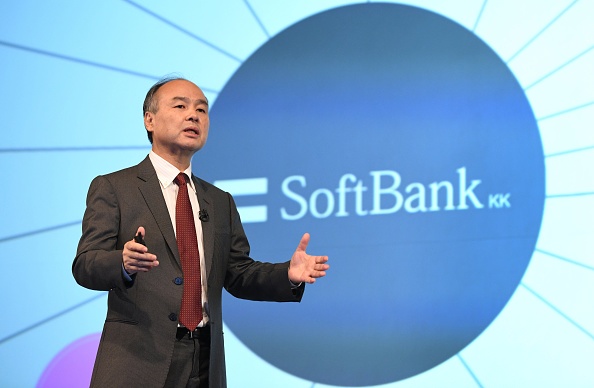The daily business briefing: August 8, 2022
The Senate passes a sweeping climate and health bill, SoftBank reports a record $23 billion quarterly loss, and more


A free daily email with the biggest news stories of the day – and the best features from TheWeek.com
You are now subscribed
Your newsletter sign-up was successful
1. Senate passes sweeping climate, health bill
The Senate on Sunday passed a spending bill that includes an unprecedented $400 billion to reduce greenhouse gas emissions and several major health provisions, including reduced prescription drug costs for the elderly. It offsets the spending with a new tax on some corporations currently paying nothing to the federal government, and other tax changes. Democrats scaled down the bill from President Biden's $2.2 trillion Build Back Better package after long negotiations with moderate Democratic Sens. Joe Manchin (W.Va.) and Kyrsten Sinema (Ariz.), and renamed it the Inflation Reduction Act. Democrats pushed it through the Senate with no Republican votes using a process known as reconciliation. Hoouse Speaker Nancy Pelosi (D-Calif.) said the House would "move swiftly" to pass the bill, likely on Friday.
The New York Times The Washington Post
2. SoftBank reports record quarterly loss
Japanese technology investor SoftBank Group Corp. on Monday reported a record $23 billion quarterly net loss fueled by plunging valuations of stocks held by its large Vision Fund unit. Shares of Uber and DoorDash, two U.S. companies SoftBank invested in, dropped more than 40 percent in the second quarter. SoftBank founder and CEO Masayoshi Son has vowed to tighten investing criteria and preserve the company's cash to help it weather the downturn. Son said the company invested in too many tech startups last year as some companies' stocks skyrocketed in the pandemic era. "When we were turning out big profits, I became somewhat delirious, and looking back at myself now, I am quite embarrassed and remorseful," Son said.
The Week
Escape your echo chamber. Get the facts behind the news, plus analysis from multiple perspectives.

Sign up for The Week's Free Newsletters
From our morning news briefing to a weekly Good News Newsletter, get the best of The Week delivered directly to your inbox.
From our morning news briefing to a weekly Good News Newsletter, get the best of The Week delivered directly to your inbox.
Reuters The Wall Street Journal
3. Airlines cancel hundreds of flights in latest travel disruptions
Airlines canceled hundreds of flights over the weekend, in the latest round of disruptions for travelers. At least 912 flights were canceled on Sunday, according to flight-tracking website FlightAware, following 657 cancellations and 7,267 delays on domestic and international departures and arrivals on Saturday. Chicago O'Hare airport experienced the worst disruptions on Sunday, with 12 percent of its flights canceled and more than 40 percent delayed. Many airlines that cut back on flights early in the coronavirus pandemic have had trouble keeping fully staffed since travel rebounded. The Transportation Department last week announced it was considering extending protections for passengers requesting refunds rather than alternative transportation after canceled flights.
4. Report: CVS trying to buy Signify Health
CVS Health Corp. is negotiating to buy Signify Health as part of an effort to expand the drugstore giant's home-health operations, The Wall Street Journal reported Sunday, citing people familiar with the matter. The Journal reported last week that Signify Health, which has a market value of roughly $4.7 billion, was exploring strategic alternatives, including a possible sale. CVS, which has a market value around $134 billion, has long focused on its pharmacies and Aetna health-insurance operation, but it has been pushing to offer more health services. CVS reportedly considered buying the parent company of primary-care clinic operator One Medical before Amazon agreed to acquire it last month for $3.9 billion.
A free daily email with the biggest news stories of the day – and the best features from TheWeek.com
5. Stock futures rise after S&P 500's 3rd straight week of gains
U.S. stock futures rose early Monday ahead of a key inflation report this week. Futures tied to the Dow Jones Industrial Average and the S&P 500 were up 0.3 percent at 6:30 a.m. ET. Nasdaq futures were up 0.4 percent. The S&P 500 posted its third straight week of gains last week. An unexpectedly strong July jobs report released on Friday eased fears that the economy would tip into a recession as the Federal Reserve aggressively raises interest rates to fight the highest inflation in 40 years. "The strong gains in the job market last month should further cement the claim that the U.S. is currently not in recession," said Jeffrey Roach, chief economist at LPL Financial.
Harold Maass is a contributing editor at The Week. He has been writing for The Week since the 2001 debut of the U.S. print edition and served as editor of TheWeek.com when it launched in 2008. Harold started his career as a newspaper reporter in South Florida and Haiti. He has previously worked for a variety of news outlets, including The Miami Herald, ABC News and Fox News, and for several years wrote a daily roundup of financial news for The Week and Yahoo Finance.
